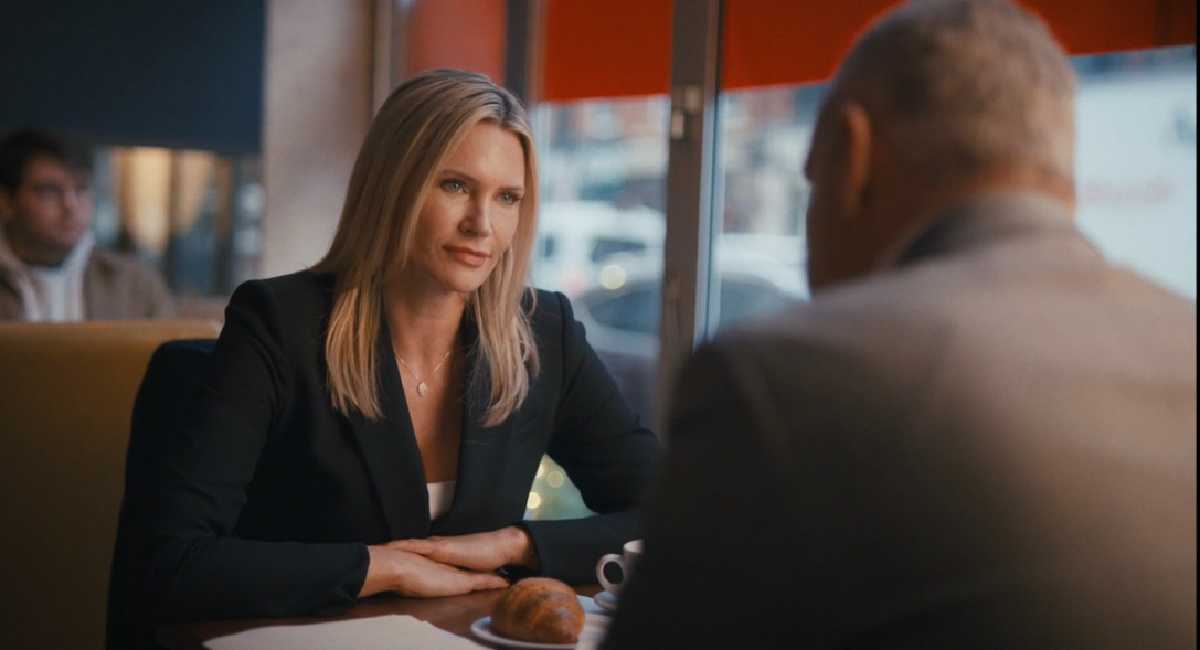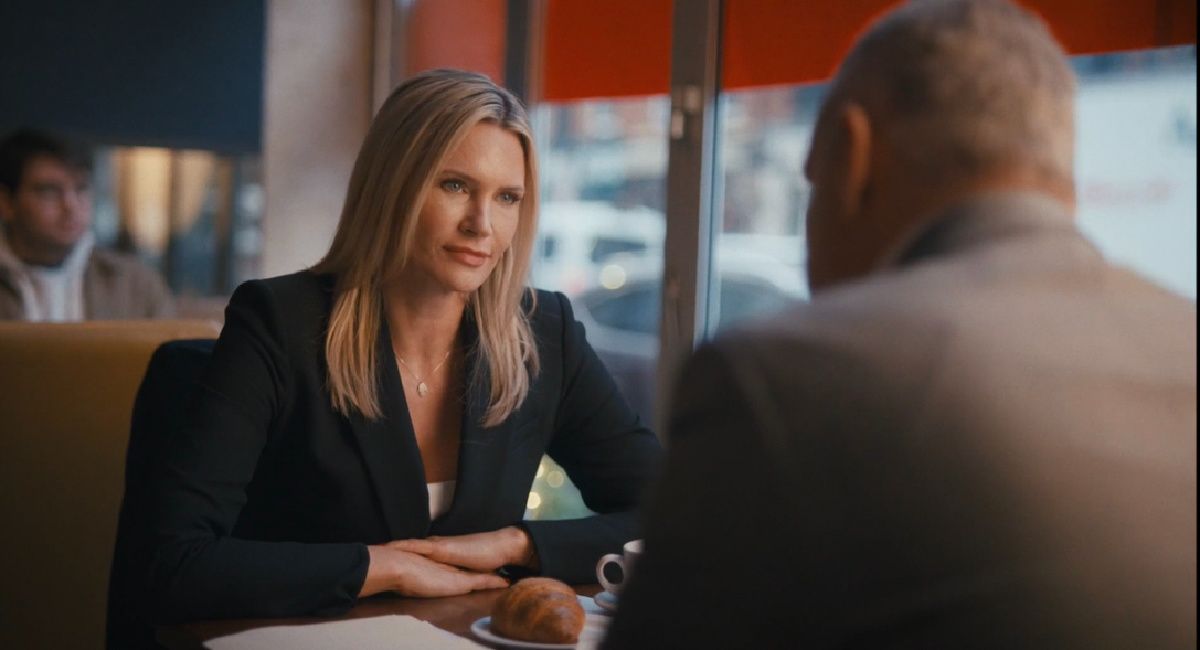
Natasha Henstridge in ‘Another Day in America’.
Premiering at the Boston International Film Festival on April 14th is the new movie ‘Another Day in America,’ which was written and directed by Emilio Mauro (‘By the Gun’) and stars Alexis Knapp (‘Pitch Perfect’), Ritchie Coster (‘The Dark Knight’), Paul Ben-Victor (‘The Irishman’), and Natasha Henstridge (‘Species’).
Moviefone recently had the pleasure of speaking with writer and director Emilio Mauro about his work on ‘Another Day in America’, developing the screenplay, balancing the tones, casting, working with the actors, the festival circuit, his creative inspiration and what’s up next for him as a filmmaker.
Related Article: Every Michael Mann Movie, Ranked!
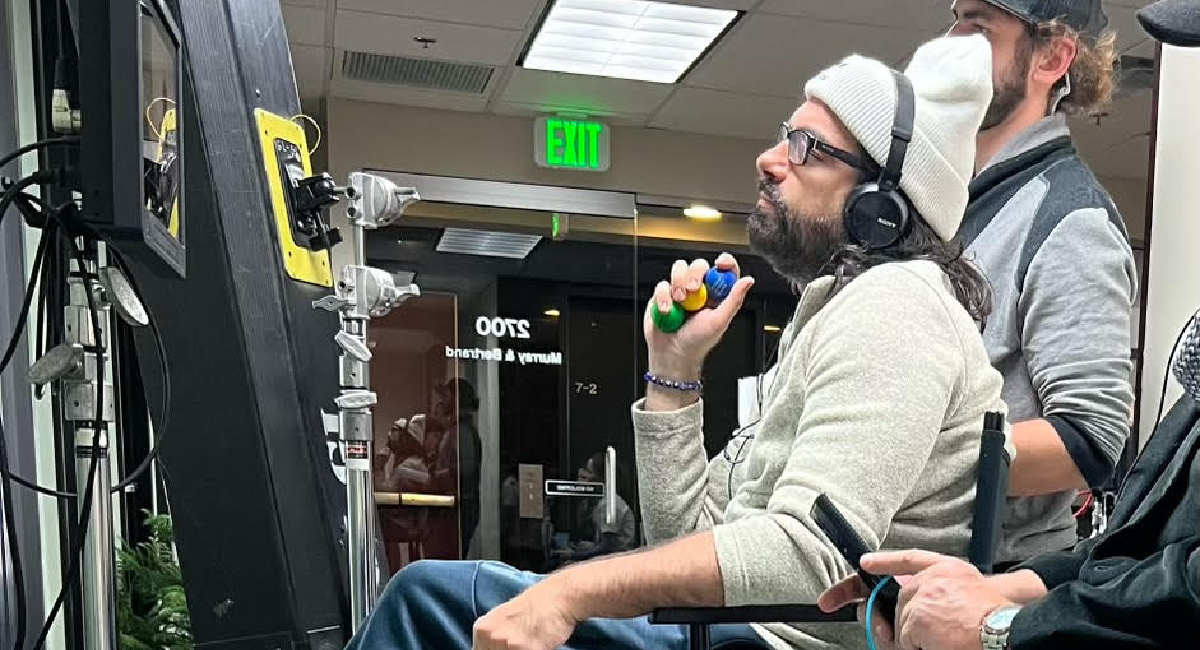
Writer and Director Emilio Mauro on the set of ‘Another Day in America’.
Note: Some Spoilers for ‘Another Day in America’ below!
Moviefone: To begin with, can you talk about developing the screenplay and as a director what were some of the themes you were excited to explore?
Emilio Mauro: There was a shooting in Wakefield, Massachusetts in 1999 at a company called Edgewater Technologies. What I noticed about that shooting, even though shootings were still rare then, it was the first time I thought about the victims, and it’s because it happened the day after Christmas. But anyway, eight people died, and I just thought it was such an odd day to be in the office. I just thought about the people going in the office that day. It really affected me. This goes back almost 25 years now. I wrote myself into a corner saying, “This is how I want to end it. I want it to come out of nowhere. I want people to experience it the way people normally would experience a mass shooting, where they’re grocery shopping, or at a movie theater, or whatever, and this awful thing happens.” But then I’ve set these rules where, I want something that leaks into the office that’s cultural, and social. I didn’t want to make ‘Glengarry, Glen Ross,’ that ends up oddly. The tone of the film is where I really needed to hit home, and the pocket I needed to land in. It tonally makes sense after watching it, because I’m talking about America, about some of our social issues, some of our cultural issues, some hot topics, and things like that. As far as themes, I don’t even know if this is really a theme, but there is this age thing going on in the office, with this new attitude versus this old attitude, this patriarchy in this company, and maybe in our country, depending on how you see it, is crumbling. For good or bad, I’m not here to make people’s decisions up for them. That’s really one other thing I wanted to hit home, which is I didn’t want to be preachy. I really wanted both arguments to land as best I could. I think that’s a strength of mine as a writer, which is empathy. I said this in another interview, but I’m going to say it again. I don’t think you should be writing unless you can have some empathy for everyone, even if it’s a blockbuster. Thanos is a great character, so it’s okay to empathize a little bit. You can hate him, and you can root against him, but I think being a writer, being able to see his point of view, it makes for a better character. I think that’s another thing I wanted to land. But I said that if a million people watch this film, which I hope they do, I hope I get a million different point of views, or emotional responses, and that they all watch a different movie, in some way.
MF: The movie begins like an office comedy commenting on workplace culture and then becomes a drama about mental health and gun violence. Can you talk about the challenges of balancing the different tones?
EM: So, structurally, I’ll never write like this again, as a feature. It’s hard. There were no third act, there’s no turning points. The linkage and the craft that you learn as a screenwriter, it’s slightly thrown out the window. I wrote it episodically, you’ll notice there’s time slots, and every time I’m leading something towards the end, every time is an episode, in my mind. The goal was to smoke screen the audience a little bit, because I just wanted them to feel something. It’s almost a two-hour film. This whole entire film for me is a movie about a mass shooting. No mistake about it. What I’m trying to accomplish is to capture your attention. I’m trying to keep you involved, and I’m just using different genre elements to do it. Either it’s drama, or a dark comedy, or a satire, or whatever. Really that’s where it came from. It was slightly by design, but I started writing the first draft, and really it really came out like, “Oh, these guys are funny. These guys have some common banter.” But as I get closer to the end, I get more serious. There is someone who’s dealing with a breakup, who’s bipolar, and he’s miserable, and obviously he has his moment at the end. It was more of a genre balance, with a tone balance. I hate to call my film experimental, but it slightly was to me writing it. As far as directing it, it was simple, because there were so many carve outs within the actors. I didn’t really ask many actors to do two things, except for maybe one, and that was to be serious. Mostly they stayed in their pocket of either comedy, or satire, or drama, or a combination of both.
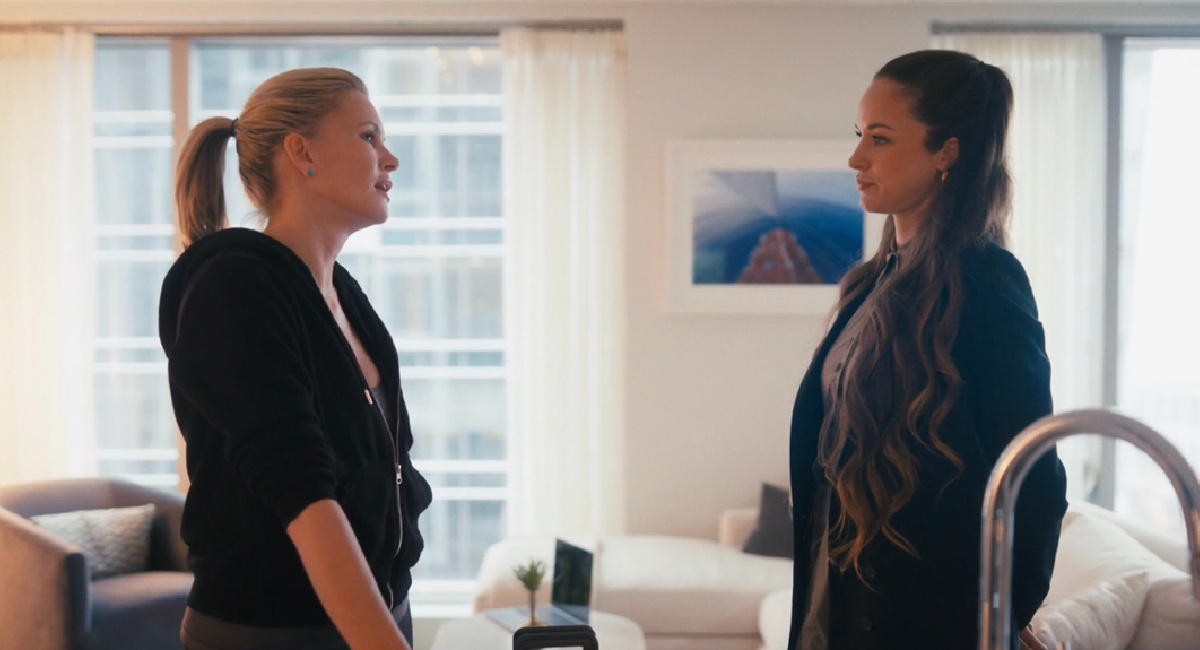
(L to R) Natasha Henstridge and Alexis Knapp in ‘Another Day in America’.
MF: The movie includes young actors and veteran actors; can you talk about putting together the cast?
EM: This is a pretty small film. I had these three tiers of actors, and there’s no disrespect for any of them. I think they all did great. I had these really working veteran actors, that work, and most likely probably pay their bills acting. Then I have these professional actors that haven’t broke through yet, and then I had complete unknowns, literally. Every approach was different. There are blueprints in the script, so they’re reading the script, but with certain actors there was a complete rewrite, and some actors wouldn’t change a word. Some actors came in, just because I wanted to work with them, and we created a character together. This is all from personal relationships, and then Oliver Trevena, who played Scott in the film, was a producer on the film. He helped me cast Natasha and Alexis, but everyone else I knew in some way. Domaine Javier, who played Star, was one of the only ones that was through a real casting process, where I had to look at audition tapes.
MF: What was it like for you directing accomplished actors such as Richie Coster, Paul Ben-Victor and Natasha Henstridge on set?
EM: They’re pros. They just make it so easy. They really do. I mean, I asked Richie a lot of questions, because he’s worked with Michael Mann. I’m like, “How’s it like working with Michael Mann?” Paul’s great. I mean, they’re all really pros. Just to see how they’re acting against each other was interesting. But a lot of my work with the actors were done in prep. I’d say 70% of what I do as a director is on the page. I think then the rest of it’s probably during prep, and there’s not much I do on set. I feel like I’m more of a manager of department heads, and I’m just tweaking. If I see something I’m like, “Oh, try it this way, or try it that way.” But it was game time, so they were all into it. It was game seven every day. They took it seriously, and it was great. I think that goes for the whole cast. I think some were just real pros and just wanted to do their job, as best they can, and some wanted to have something to prove, and wanted to do more work. But it was great working with those guys.
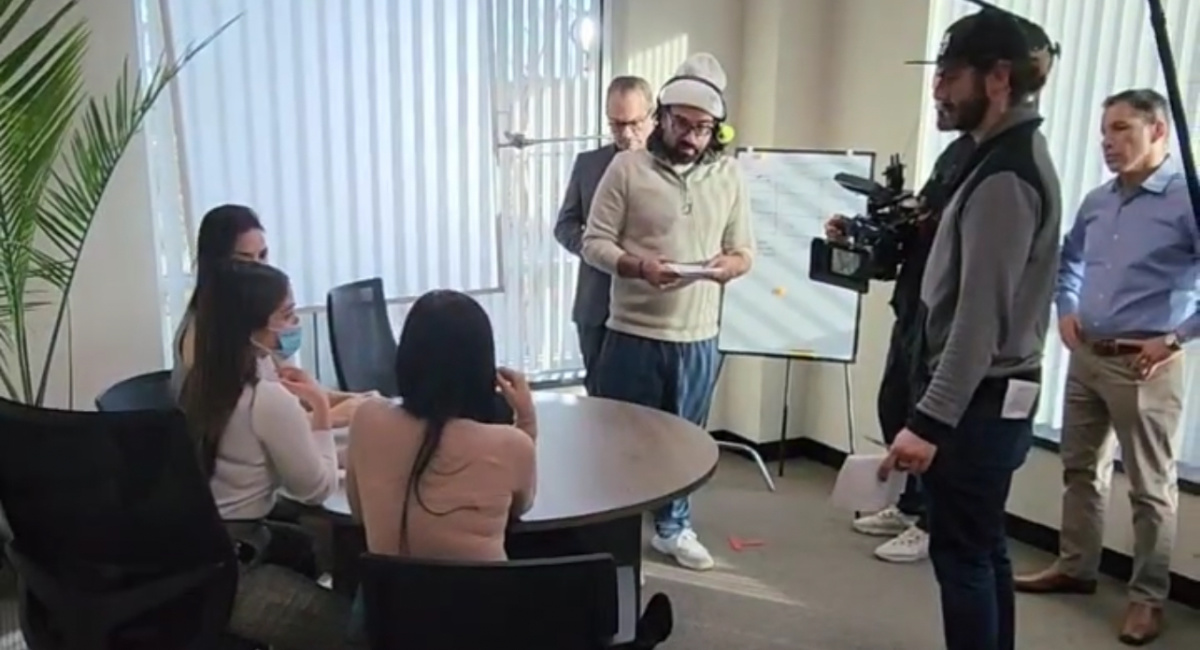
(Center) Writer and Director Emilio Mauro on the set of ‘Another Day in America’.
MF: Can you talk about some of your creative influences as a writer and director?
EM: Well, Duke Ellington had the quote, “Art’s supposed to be dangerous.” I mean, it’s a wild film. I use hard language. I push areas that I call “outside the lines.” I don’t think I could have made it without Duke Ellington’s quote, to be honest with you. I was scared. Charlie Kaufman‘s quote was something that I saw, just when he was writing it, about how as artists, we’re storytellers, but we’re supposed to tell a truth. I’m not here to tell you how to believe, but I’m telling you a story and if that story resonates like, “I know that person,” or “I am that person,” I want my movie to be a mirror. I would love to go make a big blockbuster film, but I think it all must be mirrors. I’m a huge Marvel fan, so when I watch ‘Avengers: Endgame,’ I get emotional, when I hear “On your left”. So, I just feel like as storytellers we’re the shield of society, as artists. We’re supposed to present things and show things that other people can’t. I always say, “Don’t judge this as an op-ed. I’m not a journalist. If you do that, then please don’t watch the movie.” The other movies (that were inspirations) are simple. ‘Reservoir Dogs,’ just because at that time people were telling Tarantino, “You can’t say this, you can’t do that. You can’t do the ear thing.” Also, it all takes place in one location, somewhat. Mine does too. I think tonally, I always think how ‘American Beauty’ would play today. I think it’s a classic. I love it. It’s one of my favorite films. I feel like a lot of the DNA in ‘American Beauty’ leaks into here, in some capacity. Because it’s real. I think if you really breakdown ‘American Beauty,’ you got this guy in a midlife crisis, and the high school girl, so it’s real pushing the boundaries of art and storytelling. But also, ‘Chasing Amy’ was in there too, just because of the language. It’s easy to say David Mamet, but I get that a little bit. It’s such a compliment. Mamet’s great at dialogue, and a lot of people see this as a play, because it is 90% in the office. But I think that Duke Ellington quote’s the one that really hit home and gave me ultimately the courage to keep going. It’s a great quote.
MF: Finally, what has it been like taking ‘Another Day in America’ out to film festivals and what’s next for you as a filmmaker?
EM: The festival circuit’s been great. It’s new to me. All of this is new. I never directed before. I want to keep directing, and it’s good to get it out there, and to show a sample. Look, I don’t have a buyer. There’s no distributor. I have a good sales company, so hopefully a distributor picks it up and sees the potential in the film. I think it’s got a lot of viral material in there. I think that’s a good word to use, especially in today’s marketplace, everyone’s on their phones. My movie, in a very odd way, makes some statement about social media, and our iPhones, and how we consume content. But as far as what’s next, I want to make a bigger film. I am going to be blunt; this was hard. I admire 20-year-old film directors. I’m not 20. But I have a script called ‘Unsolved’. It’s making the rounds, and we’re organizing the producing team. I’d want to do less producing on my next film too. I really wore way too many hats. Then I got this TV series that I wrote, that takes place in an office. It’s about the mid 2000’s mortgage boom to crash and it’s loosely autobiographical. Obviously, I want to continue working, but I always said I did this film out of desperation. This is either day one or the last day, right? Because it’s a hard business, and I just wanted to go out with something that was me, and that represented me as an artist, as a writer, as a director, as a filmmaker, and I came close to it. I think I always said I wanted to make a contemporary 90s film. I’m pretty sure I did that. I’m proud of it, and everyone did great, and hopefully we can all keep working.

Based on true events: Another Day in America tells the stories of an ensemble of distinct characters as they each make their way through a seemingly normal workday… Read the Plot
What is the plot of ‘Another Day in America’?
Based on true events: ‘Another Day in America’ tells the stories of an ensemble of distinct characters as they each make their way through a seemingly normal workday which begins to unwind. As pressure mounts, each character is pushed closer and closer to the brink, culminating in a harrowing and psychologically explosive conclusion.
Who is in the cast of ‘Another Day in America’?
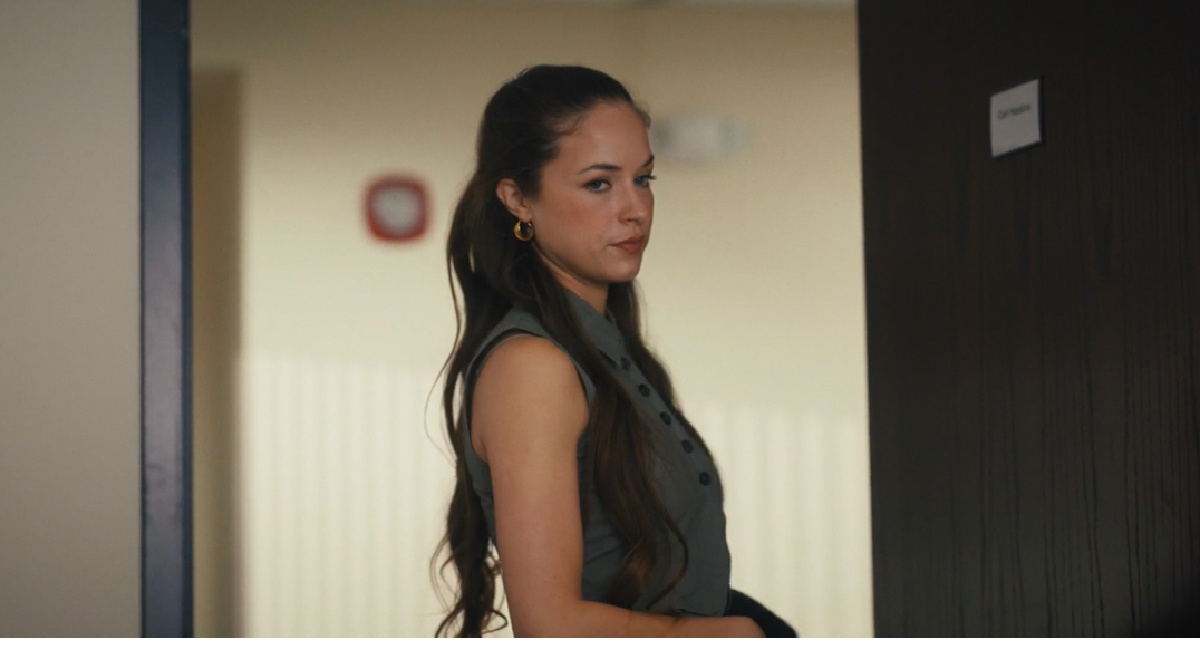
Alexis Knapp in ‘Another Day in America’.
Other Movies Similar to ‘Another Day in America:’
Buy ‘By the Gun’ Movie On Amazon
